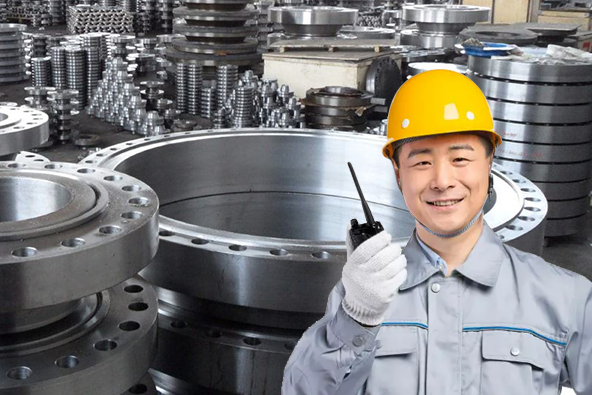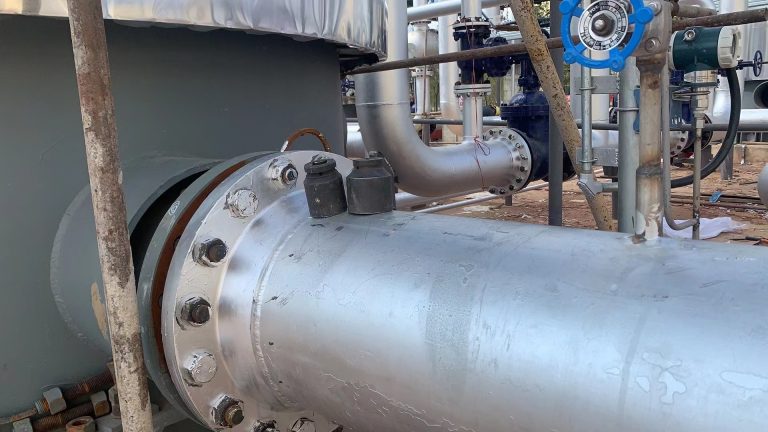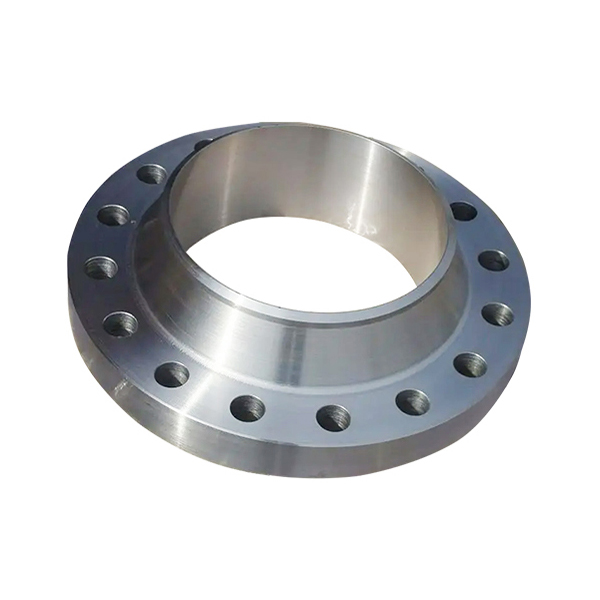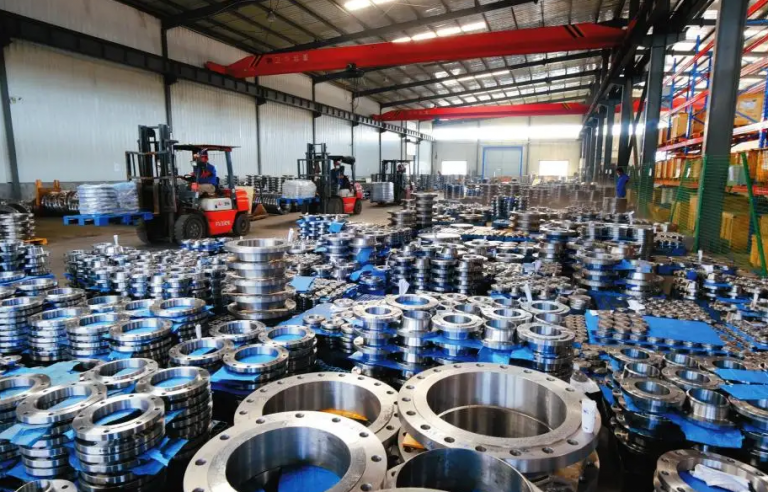I. Introduction
Flanges, often overlooked components, play an indispensable role in the seamless functioning of various industrial processes. These seemingly small, circular devices serve as connectors, joining pipes, valves, and other equipment, forming a robust network that facilitates fluid or gas transfer. The significance of flanges lies in their ability to ensure the integrity and efficiency of complex systems.

In the demanding landscapes of industrial operations, corrosion emerges as a formidable adversary, capable of compromising the structural integrity of essential components. Flanges, exposed to diverse environmental conditions and substances, are particularly vulnerable to corrosion. Hence, the choice of materials for flange construction becomes a pivotal factor in ensuring longevity, reliability, and safety in industrial setups.
In the subsequent sections, we delve into the intricacies of corrosion, the advantages of employing stainless steel, and the key considerations when selecting corrosion-resistant flanges, shedding light on how YANHAO’s commitment to quality aligns with these critical requirements.
II. Understanding Corrosion in Flanges
Understanding Corrosion in Flanges: Safeguarding Performance and Safety
Corrosion, a relentless force in industrial settings, poses a multifaceted threat to the integrity of flanges. It manifests in various forms, each with distinct characteristics and consequences that necessitate a nuanced approach to corrosion resistance.
Types of Corrosion Affecting Flanges
1. Uniform Corrosion:
- Surface-wide degradation caused by consistent exposure to corrosive elements.
- Gradual loss of material, potentially compromising structural integrity over time.
2. Pitting Corrosion:
- Localized damage characterized by small pits on the flange surface.
- Often more challenging to detect, pitting corrosion can lead to unexpected failures.
3. Crevice Corrosion:
- Occurs in confined spaces or crevices where oxygen levels are reduced.
- Common in flanges with tight gasketed joints, where stagnant corrosive fluids may accumulate.
4. Galvanic Corrosion:
- Caused by the electrochemical interaction between dissimilar metals.
- Understanding galvanic series is crucial in preventing corrosion in mixed-material flange assemblies.
Impact of Corrosion on Performance and Safety
Corrosion’s insidious effects extend beyond mere aesthetics; they profoundly impact the performance and safety of industrial systems.
1. Diminished Performance:
- Corroded flanges experience reduced efficiency, affecting fluid or gas flow rates.
- Increased friction and turbulence may lead to system inefficiencies and higher energy consumption.
2. Safety Concerns:
- Weakened structural integrity raises the risk of catastrophic failures.
- Undetected corrosion can compromise the reliability of critical processes, posing safety hazards for personnel and the environment.
In the subsequent sections, we explore stainless steel as a corrosion-resistant solution and the key factors to consider when selecting stainless steel flanges, providing insights into how YANHAO’s dedication to quality aligns with addressing corrosion challenges in industrial applications.
III. Stainless Steel as a Corrosion-Resistant Solution
In the realm of corrosion-resistant materials, stainless steel stands out as a formidable solution, offering a unique combination of properties that safeguard flanges against the relentless forces of corrosion. Let’s delve into the key attributes that make stainless steel an ideal choice and compare it with alternative materials.
Properties that Make Stainless Steel Ideal for Corrosion Resistance:
- Chromium Content:
- Stainless steel contains a significant percentage of chromium, forming a protective chromium oxide layer on the surface.
- This oxide layer acts as a barrier, preventing corrosive substances from penetrating the material.
- Resistance to Pitting and Crevice Corrosion:
- Stainless steel demonstrates remarkable resistance to localized corrosion, including pitting and crevice corrosion.
- This resistance is crucial for maintaining the structural integrity of flanges in challenging environments.
- High Strength and Durability:
- Stainless steel exhibits exceptional strength and durability, ensuring that flanges can withstand mechanical stresses and harsh operational conditions.
- This longevity contributes to a prolonged service life for flanges, reducing the need for frequent replacements.
- Temperature and Pressure Resilience:
- Stainless steel maintains its corrosion resistance across a wide range of temperatures and pressures, making it versatile for diverse industrial applications.
- This resilience ensures consistent performance under varying operational conditions.
Comparison with Other Materials:
- Versus Carbon Steel:
- Unlike carbon steel, stainless steel does not corrode as easily, making it more suitable for environments with high moisture or chemical exposure.
- Stainless steel’s corrosion resistance reduces maintenance costs and enhances the overall reliability of flanges.
- Versus Non-Metallic Materials:
- Compared to non-metallic materials like plastics, stainless steel provides superior strength and resistance to elevated temperatures.
- Stainless steel is also less prone to degradation from UV exposure, offering a more robust solution for outdoor applications.
- Versus Other Alloys:
- In comparison to other alloys, stainless steel’s corrosion resistance is a standout feature, making it a preferred material for critical components like flanges.
- The combination of corrosion resistance, strength, and durability positions stainless steel as a reliable choice in demanding industrial settings.
Understanding the unparalleled advantages of stainless steel sets the stage for the subsequent exploration of key factors to consider when selecting stainless steel flanges. This knowledge empowers industries to make informed choices that align with the commitment to quality, durability, and innovation exemplified by YANHAO.
IV. Key Factors in Selecting Stainless Steel Flanges
When choosing stainless steel flanges for industrial applications, several critical factors come into play to ensure optimal performance, safety, and longevity. Let’s delve into the key considerations that should guide the selection process.
1. Temperature and Pressure Considerations:
The performance and reliability of stainless steel flanges are closely tied to the operating conditions within an industrial environment. Temperature and pressure considerations are pivotal factors in determining the appropriate stainless steel grade for flanges, ensuring they meet the specific demands of diverse applications.
Key Considerations:
- Temperature Range:
- Evaluate the Extremes: Begin by assessing the anticipated temperature extremes the flange will be exposed to in its operational environment.
- Stainless Steel’s Thermal Resistance: Stainless steel is renowned for its robust resistance to both high and low temperatures. This inherent quality ensures that the flanges maintain consistent performance across a broad range of thermal conditions.
- Pressure Ratings:
- Align with Application Requirements: Match the pressure ratings of the stainless steel flanges with the precise requirements of the application.
- High-Pressure Capabilities: One of the distinctive features of stainless steel flanges is their ability to withstand high pressures, making them well-suited for a variety of industrial settings where rigorous demands on pressure integrity exist.
Practical Application: Consider a scenario where stainless steel flanges are integral components in a chemical processing plant. The plant operates in a diverse range of temperatures due to the nature of the chemical reactions involved. Stainless steel flanges, with their excellent thermal resistance, ensure the structural integrity of the system across fluctuating temperatures. Additionally, the high-pressure capabilities of stainless steel are crucial for maintaining the integrity of the pipelines, where pressures vary during different stages of the chemical processes.
Conclusion: In the meticulous selection of stainless steel flanges, a comprehensive understanding of the temperature and pressure conditions within the operational environment is paramount. Stainless steel’s resilience to extreme temperatures and its capacity to handle high pressures make it a reliable choice for industries seeking durable and performance-driven solutions. This aligns seamlessly with YANHAO’s commitment to providing high-quality, corrosion-resistant flanges tailored to meet the unique challenges of industrial applications.
2. Corrosive Environments and Chemical Compatibility:
In the quest for optimal performance and longevity of stainless steel flanges, a critical aspect involves understanding and mitigating the impact of corrosive elements present in the operational environment. This includes a careful consideration of the corrosive agents and ensuring chemical compatibility, underlining the importance of selecting stainless steel flanges with the right resistance properties.
Key Considerations:
- Corrosive Agents:
- Understanding the Nature: Begin by comprehensively identifying the corrosive substances present in the environment where the flanges will operate.
- Versatility of Stainless Steel: Stainless steel’s unique property lies in its resistance to a wide range of corrosive agents. This inherent versatility makes it an excellent choice for applications where exposure to diverse chemicals is inevitable.
- Chemical Compatibility:
- Fluids or Gases in the System: Evaluate the fluids or gases that will pass through the system where stainless steel flanges are employed.
- Corrosion Resistance: Stainless steel’s corrosion resistance is a defining characteristic that minimizes the risk of chemical-induced degradation. This ensures the structural integrity of the flanges even when subjected to aggressive chemical environments.
Practical Application: Consider an industrial setting such as a wastewater treatment plant. In this environment, corrosive elements, including various chemicals and contaminants, are present in the fluids being processed. Stainless steel flanges, due to their resistance to a broad spectrum of corrosive agents, prove to be ideal for maintaining structural integrity in such a challenging setting. The chemical compatibility of stainless steel ensures that the flanges remain robust even when exposed to the diverse and potentially aggressive chemical compositions in wastewater.
Conclusion: The meticulous consideration of corrosive environments and chemical compatibility is imperative when selecting stainless steel flanges. Stainless steel’s versatility and corrosion resistance make it a reliable choice for industries operating in environments where exposure to diverse and potentially aggressive chemicals is unavoidable. This aligns seamlessly with YANHAO’s commitment to providing high-quality, corrosion-resistant flanges tailored to meet the specific challenges posed by industrial applications.
3. Industry Standards and Certifications:
The adherence to industry standards and certifications is a fundamental aspect of guaranteeing the quality, safety, and reliability of stainless steel flanges. In an industry where precision and consistency are paramount, the following key considerations ensure that the selected stainless steel flanges meet and exceed the established benchmarks.
Key Considerations:
- ASTM Standards:
- Verification of Compliance: Rigorously verify that the stainless steel flanges meet the standards established by the American Society for Testing and Materials (ASTM).
- Quality Assurance: ASTM standards serve as a benchmark for the quality and performance of materials. Ensuring compliance assures the flanges’ reliability and durability in diverse applications.
- ASME Certification:
- Compliance with Rigorous Standards: Ensure that the stainless steel flanges adhere to the standards set by the American Society of Mechanical Engineers (ASME).
- Holistic Approach: ASME certification covers various aspects, including design, manufacturing, and testing. This comprehensive certification ensures that the flanges meet the highest industry standards.
- ISO Certification:
- Global Quality Standards: Seek stainless steel flanges with International Organization for Standardization (ISO) certification.
- Performance Assurance: ISO certification indicates adherence to globally recognized quality and performance standards, reflecting a commitment to delivering products that consistently meet customer expectations.
Practical Application: Consider a scenario where stainless steel flanges are integrated into a high-pressure pipeline system within a petrochemical plant. Adherence to ASTM standards ensures that the stainless steel used in the flanges possesses the required mechanical and chemical properties to withstand the harsh conditions. ASME certification provides assurance regarding the design integrity, manufacturing precision, and rigorous testing, all crucial factors in guaranteeing the reliability of the flanges. ISO certification further underscores the commitment to maintaining global quality standards in the manufacturing process.
Conclusion: The meticulous consideration of industry standards and certifications is a non-negotiable aspect when selecting stainless steel flanges. This commitment to meeting and exceeding established benchmarks aligns seamlessly with YANHAO’s dedication to providing high-quality, reliable, and certified corrosion-resistant flanges for diverse industrial applications. Industries can confidently select YANHAO’s stainless steel flanges, knowing they meet the highest industry standards, ensuring a seamless integration into critical processes.
In the subsequent sections, we explore YANHAO’s commitment to quality and delve into practical applications through case studies, providing real-world examples of successful corrosion-resistant flange solutions.
V. YANHAO’s Commitment to Quality
At the heart of YANHAO’s reputation lies an unwavering commitment to quality, exemplified through its expertise in manufacturing stainless steel flanges. As a leading player in the industry, YANHAO stands out for its dedication to delivering products that not only meet but exceed customer expectations.
Expertise in Manufacturing Stainless Steel Flanges:
YANHAO brings a wealth of expertise to the table, especially in the precision crafting of stainless steel flanges. The company’s manufacturing processes are characterized by meticulous attention to detail, cutting-edge technology, and a profound understanding of the unique requirements posed by various industrial applications.
Commitment to Quality, Durability, and Innovation:
- Quality Assurance:
- YANHAO places paramount importance on adhering to stringent quality standards. Every stainless steel flange undergoes rigorous testing, ensuring it meets industry benchmarks for performance and reliability.
- The company’s commitment to quality is evident not only in the end product but also throughout the entire manufacturing process, from material selection to final inspection.
- Durability as a Core Tenet:
- YANHAO understands that durability is a non-negotiable attribute in industrial settings. Stainless steel flanges produced by YANHAO are engineered to withstand the harshest conditions, ensuring a prolonged service life and minimizing the need for frequent replacements.
- Innovation Driving Excellence:
- YANHAO thrives on innovation, constantly seeking new and improved ways to enhance the functionality and performance of stainless steel flanges.
- The company invests in research and development, staying at the forefront of technological advancements to provide customers with cutting-edge solutions that address evolving industry challenges.
Practical Application: Consider a case where YANHAO’s stainless steel flanges are employed in a critical offshore drilling operation. The expertise applied in the manufacturing process ensures that the flanges can endure the corrosive saltwater environment and the demanding mechanical stresses associated with drilling activities. YANHAO’s commitment to quality becomes evident as these flanges consistently deliver exceptional performance under challenging conditions.
YANHAO’s commitment to quality, durability, and innovation is not just a tagline; it’s a cornerstone of the company’s identity. The expertise embedded in every stainless steel flange reflects a dedication to crafting products that not only meet the needs of today’s industries but also anticipate and adapt to the challenges of tomorrow. When choosing YANHAO, industries are not just acquiring flanges; they are investing in a legacy of excellence that defines the very essence of the company.
VI. Case Studies and Practical Application
As a testament to YANHAO’s commitment to excellence, let’s explore real-world case studies and practical applications where YANHAO’s corrosion-resistant flanges have played a pivotal role, accompanied by testimonials from satisfied customers.
Case Study 1: Offshore Oil Rig Operations
Challenge: The client, a major player in offshore oil exploration, faced persistent issues with corrosion and reliability in their flange systems due to harsh marine environments.
Solution: YANHAO provided corrosion-resistant stainless steel flanges tailored to withstand the corrosive effects of saltwater and harsh weather conditions. The precision engineering and material quality ensured longevity and performance integrity.
Result: The client reported a significant reduction in maintenance downtime and replacement costs. YANHAO’s flanges demonstrated remarkable resistance to corrosion, contributing to enhanced operational efficiency and overall cost savings.
Case Study 2: Chemical Processing Plant
Challenge: A chemical processing plant required flanges that could withstand exposure to a wide range of corrosive chemicals and varying temperatures.
Solution: YANHAO engineered stainless steel flanges with exceptional chemical resistance, meeting the specific requirements of the chemical processing plant. The flanges were designed to maintain structural integrity in the presence of corrosive substances.
Result: The client observed a notable improvement in the reliability of their processes. YANHAO’s corrosion-resistant flanges contributed to a reduction in system failures, ensuring a continuous and efficient production flow.
Testimonials from Satisfied Customers:
- Oil and Gas Industry Professional:
- “YANHAO’s corrosion-resistant flanges exceeded our expectations in the demanding offshore environment. The durability and reliability of their products have significantly improved the performance of our operations.”
- Chemical Plant Manager:
- “We were facing constant challenges with corrosion in our flange systems until we switched to YANHAO’s stainless steel flanges. The difference has been remarkable – fewer shutdowns, less maintenance, and a boost in overall productivity.”
These case studies and testimonials underline YANHAO’s success in delivering tailored solutions that address the unique challenges faced by different industries. The real-world applications demonstrate not only the efficacy of YANHAO’s corrosion-resistant flanges but also the tangible benefits experienced by satisfied customers. When choosing YANHAO, industries are not just investing in products; they are investing in proven solutions that elevate operational efficiency and reliability.
Lewis Liu
Hello, I am Lewis Liu, a professional sales engineer with over ten years of experience in the flange fittings industry. I am highly knowledgeable in flange selection, installation, and maintenance. I am passionate about providing customers with the best solutions to ensure their pipeline systems run smoothly, safely, and reliably.
If you have any questions or concerns regarding flange fittings for your pipelines, whether it’s about selection, material choice, specification requirements, or any other aspect, please feel free to contact me at any time. I am committed to offering professional advice and assistance to help you make informed decisions and meet your needs.





